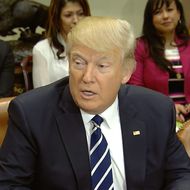Donald Trump Just Broadcast a Dangerous Misconception About Autism Rates

Those who advocate for sound, evidence-based research about autism are extremely alarmed about Donald Trump, and for good reason: In addition to Trump's ties to Andrew Wakefield, the disgraced British doctor whose debunked research helped fuel the false idea of links between childhood vaccines and autism, Robert F. Kennedy Jr., a notorious anti-vaxxer himself, told reporters back in January that Trump planned to tap him as chair of a commission on "vaccine safety." There is no question at this point that Trump has significant connections to a pseudoscientific medical movement that spreads dangerous, disproven ideas.
Today, Trump gave nervous observers yet more reason to worry. It occurred at a White House event in which Trump and Secretary of Education Betsy DeVos met with a bunch of educators. Trump seemed to fixate, for a moment, on one educator named Jane (her last name is hard to make out) after she explained that she is the principal of a special education center in Virginia.
The sequence starts at about 5:38 in this video:
After Jane noted that many of her students have autism, Trump asked, "Have you seen a big increase in the autism, with the children?" Jane replied in the affirmative, but seemed to couch her response as being more about an increase in demand for services — she didn't explicitly agree there's been a big increase in the overall rate. Trump continued: "So what's going on with autism? When you look at the tremendous increase, it's really — it's such an incredible — it's really a horrible thing to watch, the tremendous amount of increase. Do you have any idea? And you're seeing it in the school?" Jane replied — again, in a way that seems a bit noncommittal vis-à-vis Trump's claim — that the rate of autism is something like 1-in-66 or 1-in-68 children. To which Trump responds: "Well now, it's gotta be even lower [presumably meaning higher, rate-wise] than that, which is just amazing — well, maybe we can do something." (Jane had the rate right, and Trump is incorrect that it has crept higher.)
Trump is broadcasting a very inaccurate and misleading claim about autism — one that you often hear from the Kennedys and Wakefields of the world, but which experts flatly disagree with. Purveyors of this claim often point out that autism rates have increased significantly since the early 1990s, but as Steve Silberman, an autism expert and the author of NeuroTribes: The Legacy of Autism and the Future of Neurodiversity, told Science of Us, that has to do with diagnostic criteria and awareness, not the prevalence of the condition itself.
"There's no consensus as to whether or not there's been any significant increase in the actual prevalence of autism, period," says Silberman. "The real debate is whether or not there has been a small increase, and there are a number of factors that could play a role in that small increase. For instance, it's well established that older parents have more autistic kids and people are waiting longer to get married and have kids now, so there may be a small increase there. Some people claim that there are some environmental factors — notably, not vaccines — that may be contributing to a small increase. But the consensus is that there has been no huge, startling, 'horrible,' as Trump said, increase in autism. And the CDC estimate has been flat for a couple of years, just as they expected it to be, because the major source of the increase that started in the 1990s was broadened diagnostic criteria and much more public awareness of what autism looks like."
Part of what fuels the anti-vax movement is this misperception: If not too long ago autism wasn't a "crisis" (advocates for autistic people are not fans of such phrasing, for understandable reasons), but today it is, then it makes sense to look for a scapegoat like vaccines. The data we have suggests this simply isn't the case. Unfortunately, as Silberman pointed out, influential anti-vaxxers seem to have the ear of the president, and that could be contributing to his false beliefs about autism rates.
It's bad enough for the president to be trafficking in and helping to spread such dangerous pseudoscience, but Silberman said what's doubly frustrating is the opportunity cost: Time and attention spent on what are in reality autism nonissues could suck up resources that might otherwise be directed at the many gaps the U.S. has in this area. As Silberman explained, there's still a great deal public-health researchers don't know about the adult autistic population in the U.S. "We don't even know how many autistic adults are out there, trying to get by with no support, because a national prevalence survey of autism has never been done in the United States," he said.
Once many autistic people are done with high school, they lose access to many vital sources of support, in some cases rendering them effectively invisible. To Silberman, that's the sort of thing the president of the United States should be focusing on — not bunk claims that we're in the midst of some sort of scary autism "epidemic." Unfortunately, the president doesn't grant much credence to scientific consensus. "Trump tends to listen to people who he thinks are rogues, who are pushing against conventional wisdom, especially at the expense of so-called 'experts,'" said Silberman. "And just as he does in so many areas of public life, Trump is listening to the wrong people and trusting the wrong people."
^ed

No comments:
Post a Comment